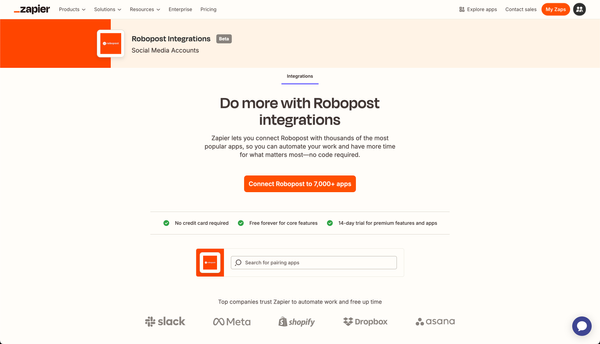Saving Time and Resources: The Economic Benefits of Social Media Automation
Explore the economic gains of social media automation for marketing efficiency, strategic operations, and enhanced customer engagement.

Social media automation is essential for businesses wanting to improve their marketing strategies and operations. Using automation tools helps companies save time, cut down on manual work, and make their marketing more efficient, leading to better financial results. This article explores the various benefits of social media automation, including its positive effects on marketing, business operations, customer relationships, and overall economic gains.
Key Takeaways
- Social media automation tools help maintain a steady online presence and offer insights to tailor marketing strategies.
- Combining automation with personal interactions is crucial for keeping customers engaged and loyal.
- Social media automation reduces costs and makes better use of marketing resources.
- E-commerce automation helps businesses handle labor shortages, scale with existing teams, and improve customer experiences.
Streamlining Marketing Strategies with Automation
The Role of Social Media Management Tools
Social media management tools are essential for businesses to simplify their marketing. These tools allow companies to schedule and automate posts, ensuring a consistent online presence, which is important for brand visibility and customer interaction. They also help track how well posts are doing and offer insights to improve future strategies.
These tools are versatile and offer many features, such as:
- Scheduling and publishing posts
- Keeping an eye on social media activity
- Engaging with followers
- Analyzing performance data
- Creating reports
For example, Robopost offers features like scheduling and publishing posts. By using these tools, businesses can automate routine tasks like posting and reporting, saving time and letting teams focus on bigger-picture strategies and creativity.
Automating Repetitive Tasks for Efficiency
Automation is key to boosting efficiency by handling repetitive, time-consuming tasks that can slow down a marketing team. By using automation, businesses can ensure these tasks are done accurately and consistently, allowing team members to focus on more complex and creative work.
- Consistency: Automation makes sure repetitive tasks are done the same way every time, reducing mistakes.
- Resource Shift: Employees can move from routine tasks to more meaningful roles like strategy and customer engagement.
- 24/7 Operation: Automated systems can run all day, every day, maintaining a constant presence on social media.
Automation not only makes processes smoother but also helps businesses grow without needing to hire more people. This approach allows teams to focus on work that drives business growth and keeps customers happy.
Maximizing Efficiency and Personalization in Marketing
Balancing Automation and Customer Relationships
Automating your social media marketing can be both helpful and risky. It boosts efficiency and productivity, but it can also take away the personal touch that customers appreciate. To get the best of both worlds, businesses should use automation in a way that supports, rather than replaces, human interaction.
For example, automation can manage tasks like combining multiple orders to save on shipping costs, but it's the personal support that builds strong customer relationships. Here are some ways to keep the right balance:
- Use automation to actively engage with customers.
- Set up feedback systems to offer personalized deals.
- Keep an eye on automation to avoid high costs and mistakes from relying too much on it.
The main goal is to use automation to increase customer interest and profits while still keeping the personal connection with customers.
Real-Time Decision Making in Marketing
Making quick decisions is key to staying competitive in social media. Automation tools help marketers respond instantly to market changes, keeping campaigns optimized for the best outcomes.
With automation, the focus shifts to using real-time data for strategic decisions. This allows companies to efficiently manage production, distribution, communication, and pricing, making marketing processes faster and more effective.
Here’s how real-time decision-making improves marketing:
- Quick campaign adjustments based on performance data
- Personalized customer experiences through dynamic content
- Better market success by efficiently managing resources
- Ongoing improvement of marketing strategies with regular feedback
The Economic Impact of Social Media Automation
Cost Savings and Resource Allocation
By automating routine tasks, businesses can assign their staff to more strategic roles, promoting innovation and growth.
The benefits of automation go beyond just saving on labor. It also helps with managing operational costs and allocating resources more effectively, reducing waste and inefficiencies. This approach not only makes operations smoother but also leads to substantial cost savings.
By adopting digital technologies, businesses can cut production costs and encourage a sharing economy, which indirectly lowers cooperation costs among companies.
Data-Driven Decisions for Better Marketing Results
By using analytics, businesses can adjust their strategies to keep up with what their audience wants. Automation tools help analyze large amounts of data smoothly, leading to smarter marketing decisions.
Keeping data accurate is crucial for successful automation. Regularly updating databases ensures precise targeting and segmentation, making sure that marketing messages are relevant and engaging. The economic benefits include smoother operations, personalized customer interactions, and better market positioning, all of which make marketing more efficient and cost-effective.
Frequently Asked Questions About E-commerce Automation
Understanding E-commerce Automation
E-commerce automation is crucial for making online retail smoother and more efficient. It handles important tasks like managing inventory, processing orders, and providing customer support automatically. This saves time and reduces mistakes, helping businesses grow without needing to hire more staff.
For example, during busy sales events like Black Friday, automation helps manage inventory and keep customers updated in real-time, ensuring a smooth shopping experience. Here’s how automation helps in e-commerce:
- Inventory Management: Automatically reorders products when they run low.
- Order Fulfillment: Handles the process of filling and shipping orders.
- Marketing: Sends targeted emails and manages promotions.
By reducing errors and speeding up processes, automation improves efficiency and enhances customer satisfaction with 24/7 support and personalized interactions.
Examples of E-commerce Automation in Action
E-commerce automation has changed how online businesses work, making them more efficient and improving customer satisfaction. It’s not just about saving time; it’s also about using resources in ways that add more value. For example, automating inventory management helps avoid running out of stock or having too much of it, so customers can always get what they want.
Here’s how automation works in practice:
- Inventory Management: Keeps track of stock levels and automatically orders more when needed.
- Order Fulfillment: Handles shipping orders automatically, making the process faster.
- Marketing: Sends customized emails based on what customers are interested in.
Using these automated tools helps businesses run more smoothly and offer better, more personalized service. It also ensures they can quickly update customers, which is especially important during busy times like Black Friday.
Addressing Labor Shortages Through Automation
With ongoing labor shortages, automation helps keep productivity up without overworking staff. Automated systems perform repetitive tasks reliably and accurately, which is important in fields where precision is key.
Automation also changes the workforce. As routine tasks are automated, there’s a greater need for skilled workers, leading employees to focus on more complex and satisfying jobs.
However, moving to automation requires careful planning and training for employees to adapt to new technology. It's also important to have policies and regulations to handle any social issues that come up with increased automation.
Conclusion
Social media automation is a game-changer for marketing. It helps businesses save time and money by handling repetitive tasks, so teams can focus on more important work. Automation tools ensure that marketing is consistent and effective, making it easier to engage with audiences and improve online presence. These tools also provide valuable data that helps businesses fine-tune their marketing strategies for better results. Using social media automation wisely can lead to big savings and more successful marketing campaigns.
